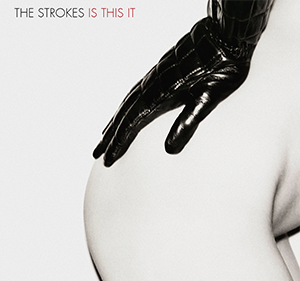
Deciphering the Enigmas of the Internet Generation
The film “Talk to Me” directed by Danny and Michael Philippo takes us into the intriguing world of “teenagers who enter the dark arts”. However, its approach goes beyond the apparent, especially for those digital natives looking to capture their creativity in the age of social networks.
Behind the Screen: The Impact of Hyperconnection on Human Relationships
How does the constant link with cyberspace influence our relationships outside of it? In this context, what defines an authentic connection?
These are just some of the questions that arise when watching “Talk to me”, the recent horror production carried out by the filmmaker brothers Danny and Michael Philippou. It’s not so much an internet-centric story per se, but rather a representation of how this invisible factor weaves into the plot and shapes the lives of the characters. In this aspect, it has similarities with the spirits that the protagonists seek to invoke.
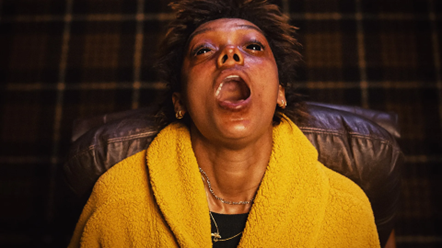
A Look at the Central Argument
“Talk to Me” revolves around Mia (Sophia Wild), a young teenager who strikes up a friendship with siblings Riley and Jade (Joe Bird and Alexandra Jensen) after the death of their mother. In the context of a house party, one of his friends reveals an enigmatic ceramic hand, inscribed with mysterious symbols. After lighting a candle and uttering the words that give the film its title, the artifact leads anyone holding it to a supernatural encounter with a deceased spirit. It even allows, with an additional command, the soul to briefly seize the body of the possessor.
Beyond the Classic Plot
Although in essence, the plot could seem like another variant of the typical films where teenagers venture into the world of black magic, “Háblame” is distinguished by the way in which each séance is presented. Each of the boys is possessed, while the others capture the moment with their phones, laughing and sharing the experience. Despite the warnings of his colleagues, these videos are shared on the network.
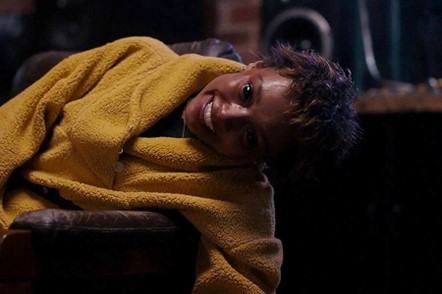
A challenging reflex
The terror in this film lies not so much in the faceless infernal beings, but in the cruelty with which friends expose and harass each other, as well as in the fear of losing the remaining ties in their family circle. In reality, for much of the film, allowing spirits to take over teenage bodies is presented as harmless mischief. The message is clear: don’t give in to spirit for too long, don’t explore too much into the supernatural depths, and all will be well.
A journey to virtual connection
The complexity increases as the spirits become more familiar and close. This aspect aligns with the film’s main themes: human connection, grief, and coping mechanisms. Most intriguing, however, is how the characters are influenced by the pressures inherent in social media.
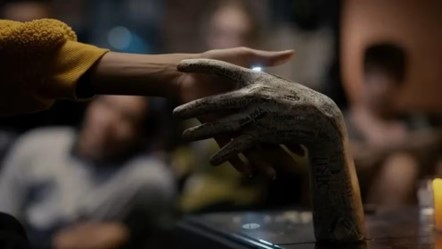
An invisible but palpable link
Although the central theme is not cybernetics itself, it is difficult to overlook, considering that the directors began their journey on YouTube. The Philippou twins have been generating video content since their youth and, at one point, one of them even got into legal trouble over a prank in a water-filled car.
When Connection Becomes a Dangerous Game
The pressure increases markedly when smartphones make their appearance. So the protagonists feel forced by their friends to experiment with supernatural powers beyond their control. Their reactions of fear and horror to the unknown become a valuable element: the content that resonates on the networks.
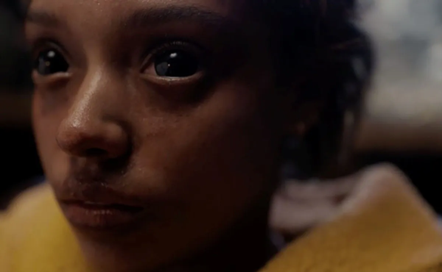
A Deeper Look
“Talk to Me” does not concentrate on the online platform itself; Likes and comments have no prominence, and the existence of a virtual audience is not even suggested. The film, instead, emphasizes how pressure to fulfill a social role affects the psychology of those on camera.
Terror Beneath the Surface
The film expands its impact by considering the dimension of horror from an unusual angle. The plot keeps the viewer on tenterhooks as he explores the struggle to find authentic connections and community in the midst of adversity.
Inspired by the age of hyperconnection, “Háblame” transcends the simple horror genre to offer a unique perspective on human interaction in the digital age.
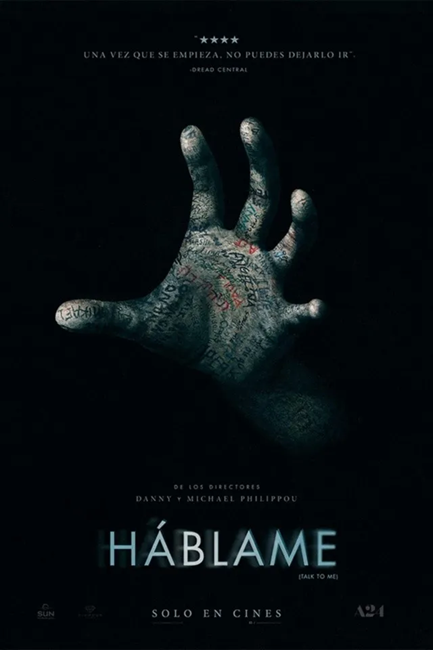
For more articles like this, click here.





